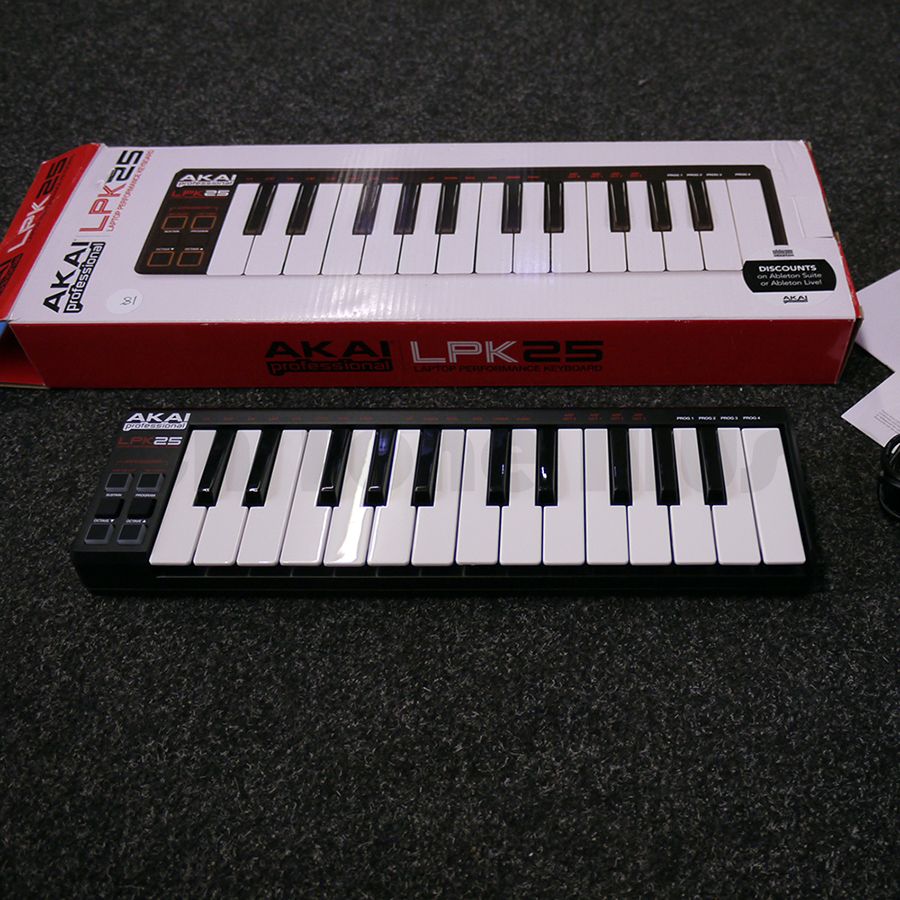

AKAI LPK25 DELAY WITHOUT INTERFACE SERIES
I'm working on setting up a udev rule to be always monitoring when USB devices are plugged in so that they can be connected automatically anytime not just at startup.We recommended the Volca series last Christmas, and we’re happy to be recommending them again this time around. This is fixed by writing a bash script with the same aconnect command and set it to run at startup. The problem is that every time you startup the RPi, you will have to re-connect the devices using aconnect. Play some notes and it should be working. This tells aconnect to send midi from QuNexus port 1 to MidiSport port 1 You should see client numbers followed by the names of the devices. To see the output devices connected to the RPi. The QuNexus is class compliant so it works as-is.
AKAI LPK25 DELAY WITHOUT INTERFACE DRIVER
I needed the driver for my MidiSport so I had to type: Plug in both devices into the USB ports on the RPiĤ. Either pull up the terminal on the RPi or ssh into it over a network.ģ. Starting with a stock RPi, powered on, running Raspbian Jessie and connected to network/internet.Ģ. I’m pretty sure you could use one of those cheap midi/USB cable interfaces too.ġ. Here I am plugging in an KMI QuNexus and a MidiSport 2x2 into the RPi and routing the information from the QuNexus Port 1 to MIDI Port A Out on the MidiSport. Provides 4 USB (RPi2) to two midi in/outs. Have you used it with the newest firmware? I was hoping to use it to add midi in to a Novation Xiosynth for pads, and midi sync for korg sq1 Scott Willingham wrote:Ordered one of the Hobbytronics boards (the mini version) programmed with the MIDI option a while back. Embedded in some synthesizers? (Nicest option to have simple USB-cable hookup to keyboard, supplying power and data.) Embedded in the mini keyboard to convert USB device to generic DIN MIDI? Or a separate stand-alone box? Need to work out some clean mechanical connections and power. So this seems like an affordable product that does a simple job with no fuss. This setup worked great to play the MT using the Keystation! I hooked up the MIDI TX data to my Monotribe's internal RX wire (plus ground), using an external source for 5V power. Seems like a bit too much current to steal from my Monotribe supply, but ok with other power arrangements. After pairing with my M-Audio Keystation Mini 32, the total current went to 71-85 mA, depending mainly on which LEDs were lit on the controller. The Hobbytronics board itself pulls about 25 mA from 5V. Most of the time, the notes come individually in different USB packets, but occasionally I'd see them come in one continuous burst across two or three USB intervals. I captured bursts of data where I tried to press several keys simultaneously. Assuming the controller is not delaying its dispatch of the notes, that leads to about 2 ms worst-case delay in note messages (one at a time). So basic monophonic notes appear complete within the nearest USB packet with no undue delays, as I expected. A basic on or off sequence takes about 608 us to complete, as expected. MIDI key on/off packets start about 208 us after the start of the USB burst. The USB packets are generated at a 1 ms interval. I put the USB and MIDI signals on my oscilloscope and took a look. Just tried it out today and it looks good, at least for the kind of things I would use it for, such as mini-keyboards and monophonic usage. Ordered one of the Hobbytronics boards (the mini version) programmed with the MIDI option a while back.


 0 kommentar(er)
0 kommentar(er)
